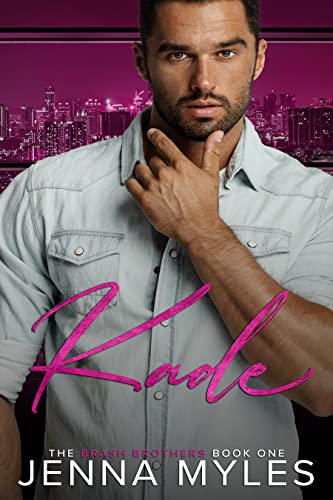Kade – Brash Brothers Book 1 – Jenna Myles

BookTok has a lot to answer for. One scroll through your feed and you’ll find The Brash Brothers series by Jenna Myles practically shoved into your eyeballs – shirtless men, steamy stares, and bold declarations like “I loved every second!” and “So funny!” dominate your feed. But beneath the glossy marketing and viral TikToks, Kade, the first book in the series, begs a much more serious question: is this book actually good?
Unfortunately, the answer might be as painful as reading the first page.
Right out of the gate, the book throws a curveball in the worst possible way – a summary. Not of the previous story, not a teaser, but a deadpan summary of who every character is, who they end up with, and what their jobs are, not just for this book but for the first three! You don’t even get the illusion of mystery or progression. It’s like watching a movie where someone spoils the ending before the opening credits. It makes continuing feel not just unrewarding but genuinely pointless.
Then there’s the tone. Imagine watching a campy sci-fi flick with the emotional depth of a paper plate—that’s the vibe. “Aliens” are mentioned with what I think is supposed to be humour, but the delivery is so painfully forced and out of sync with the wafer-thin character development that it lands somewhere between cringey and baffling. The language tries so hard to be witty that it loses any sense of authenticity and instead feels like a parody of itself.
And let’s talk about that “slow burn.” If by slow burn you mean both characters are instantly obsessed within 24 hours to the point of complete identity loss, then sure. But to most readers, “slow burn” implies tension, pacing, and emotional development. Kade skips all that and jumps headfirst into insta-lust with the subtlety of a wrecking ball. The only slow burn is the characters choosing to ignore each other for a few weeks, which is mostly skipped through in the narrative, losing a critical chance of putting some angst into the story.
Many books have swear words sprinkled through them, but there seems to be a genuine attempt at creating a ‘rough around the edges’ feel solely by using expletives. The word “fuck” appears 490 times in 218 pages—that’s about 2.25 times per page. Now, I don’t shy away from strong language, but at some point, it becomes less expressive and more like a placeholder for actual dialogue or emotion. It’s like using glitter to fix a crack in a wall—it might distract you for a second, but the foundation is still crumbling.
The early pages also suffer from odd word choices and jarring errors—like calling it a “door jam” instead of a “door jamb” and a “flirty hem flirting with skin” It’s small, sure, but still, it pulls you out of the story every time and disrupts what little immersion the book is trying to build.
The writing often leans on phrases like “I worried again”—even though that worry was never previously mentioned. It’s the literary equivalent of a cut-and-shut car: cobbled together, uneven, and slightly dangerous if you look too closely.
Then there’s Becca, the FMC (female main character), who shifts through a dizzying range of stereotypes. One minute, she’s strong and sassy; the next, she’s clingy and helpless. Her friendships are also poorly executed—characters we’ve never seen before are suddenly her lifelong besties, fully formed and emotionally invested, with zero setup or background (I can only assume that it’s because the character has already been listed as an important person in a future book). According to her bio, Jenna Myles has “entire worlds” and “a whole cast” mapped out in her head, and I don’t doubt it, but readers need more than headcanon. We need proper introductions, context, and actual storytelling.
At this point, you would naturally assume that this is a book that ended up in my ‘did not finish pile’, but actually, it did not. One of the things that attracted me to Jenna Myles’ books is that, like myself, she has built her family through fostering and adoption. Watching her children struggle with issues from their past inspired her to write characters with similar traumatic early life experiences, and I wanted to see if it was done justice.
Overall, it wasn’t bad. There are parts which do not reflect the general experiences of individuals who talk on this subject (mainly massive trauma dumping as a way to start a relationship), but that’s not to say that it doesn’t happen. Exploring trauma bonding of teenagers and dealing with horrific abandonment issues and the resulting self-esteem and control issues that it brings is not only accurate but one that I wish more people were aware of.
At the end of the day, Kade reads like a story built on vibes and viral potential rather than substance or structure. If you’re looking for something that genuinely delivers on emotional depth, character growth, or even just good writing, you might want to look elsewhere. This very much reads like a self-published first book, and considering that it is published by Myles High Publishing (a publisher with the same name as the author and no web presence), it probably is. While I will say that Kade would benefit from a date with a decent editor, something about it makes me want to read the second one.
If you’re okay with chaotic energy, excessive swearing, and characters that fall in love faster than you can say “Brash Autos,” then hey—this might just be your kind of ride.
Buy it here and help support the site at no cost to you!

This text offers a glimpse into several intriguing romance novels, each with its own unique twist. The emotional depth and messy realism in “Hello Trouble” by Kelsie Hoss seem especially captivating. “The Fixer Upper” by Phoebe MacLeod promises a charming departure from traditional rom-coms, which sounds refreshing. The final book in the Powerless trilogy, “Fearless,” appears to grapple with ambitious storytelling, though it might not fully satisfy readers. What ties these diverse narratives together is their exploration of human emotions and relationships. What do you think makes a romance novel truly stand out in a crowded genre?